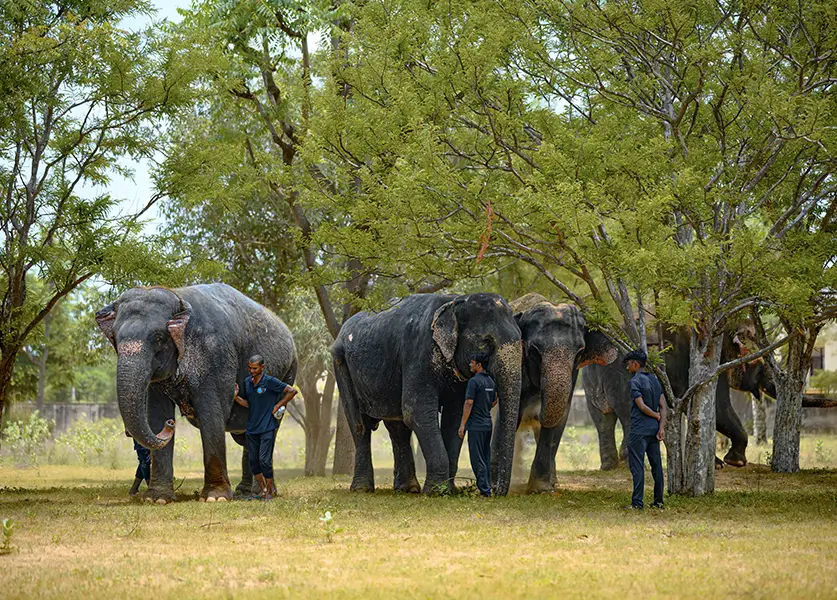
One of the most fascinating aspects of spending time with elephants is understanding their diet, eating habits, and how their overall care is managed in sanctuaries. Whether you're a wildlife lover, a curious traveler, or someone planning to visit an ethical elephant sanctuary in India, learning about what elephants eat and how they're cared for helps deepen your respect for these gentle giants.
In this detailed blog, we explore the elephant diet, their nutritional needs, what food is harmful, and how sanctuaries like Elefantastic in Jaipur maintain healthy and happy elephants.
In the wild, elephants are herbivores and consume a wide variety of plant-based food. A wild elephant can spend up to 16 hours a day eating, and may consume over 150 kg of food daily. Their diet primarily includes:
This diet provides essential fiber, minerals, and hydration. Wild elephants also drink a large amount of water, often 100–200 liters per day.
In elephant sanctuaries, the goal is to replicate a natural, balanced diet that caters to the elephant’s nutritional and emotional needs. At Elefantastic, elephants are fed a variety of safe and seasonal foods, including:
The team ensures that each elephant's preferences and age-specific needs are taken into account. Senior elephants, for example, may receive softer fruits or warm cooked meals to make digestion easier.
While elephants are known for their huge appetite, not everything is safe for them. Visitors must be aware of what NOT to feed:
These can cause serious digestive issues and long-term health complications. Sanctuaries like Elefantastic maintain strict policies to ensure that only appropriate food is provided.
One of the most beautiful parts of visiting Elefantastic Jaipur is the chance to hand-feed the elephants. This activity creates a strong emotional bond and helps visitors understand the gentle and intelligent nature of these animals.
Visitors are guided on:
This interactive experience is not just enjoyable, but deeply educational for all age groups.
A healthy elephant diet ensures:
Regular feeding schedules, fresh water availability, and a mix of solid and juicy foods keep elephants healthy and active. At Elefantastic, each elephant’s diet is closely monitored by trained caretakers and veterinarians.
Elephant care is not just about food. It’s about holistic well-being. At Elefantastic, care includes:
Their routines are based on each elephant’s personality. Some enjoy longer baths, while others look forward to mealtime or going on walks with their mahout.
If you're someone who values ethical elephant tourism in India, visiting a sanctuary like Elefantastic helps support real care, not exploitation. Elefantastic also offers:
Whether you're booking a half-day elephant experience or a multi-day India trip, Elefantastic ensures your journey is kind, respectful, and unforgettable.
Email: hello@elefantastic.in
Mobile / WhatsApp: +91-8094253150
Wild elephants eat grass, bamboo, fruits, tree bark, leaves, and roots. They can spend up to 16 hours a day foraging.
An adult elephant may consume 150–200 kg of food and drink over 100 liters of water per day.
In sanctuaries like Elefantastic, elephants are fed sugarcane, bananas, watermelons, cucumbers, green fodder, and mineral-rich supplements.
No. Processed or seasoned food is harmful. Only fresh, natural, unseasoned plant-based items should be offered.
Yes. Avoid giving chocolates, salty snacks, packaged food, or anything with plastic wrapping.
Yes. At Elefantastic, visitors can feed elephants under supervision using approved fruits like bananas and sugarcane.
Yes. Elephants love fruits like watermelon, papaya, and bananas. These are hydrating and easy to digest.
Elephants graze or are fed multiple times throughout the day — typically four to six feeding sessions.
A proper diet helps elephants maintain good health, strong bones, a healthy digestive system, and better mood.
Yes. Elephants can drink between 100 and 200 liters of water per day, depending on size and weather.
Clear eyes, smooth skin, steady energy, regular bowel movement, and an active demeanor.
Yes. Elephants enjoy fresh vegetables like cucumbers, pumpkins, and bottle gourds as part of their balanced diet.
Yes. Older elephants may be given softer fruits or lightly cooked grains to ease digestion.
Yes, under supervision. Elefantastic ensures safe, interactive feeding experiences for families with children.
Morning and early evening are ideal, as elephants are most active and it’s cooler for outdoor feeding.
Each elephant has a personalized feeding plan based on its health, age, and preferences, supervised by caretakers.
Yes, you may bring fruits like bananas or sugarcane, but always confirm with staff before offering them.
You’ll offer food directly by hand or in baskets, and sometimes watch the elephants playfully interact with the treats.
A well-fed elephant is calmer, more social, and less likely to develop stress-related behaviors.
Yes. Elefantastic provides educational insights on elephant diet, routines, health, and ethical care practices.